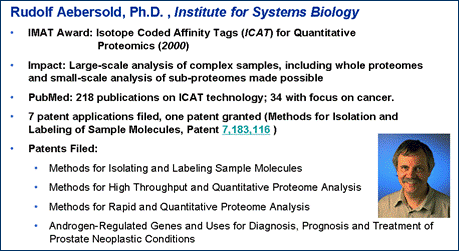| PI | Institution | Title | IMAT Award Type |
|---|---|---|---|
| Rudolf Aebersold | Institute for Systems Biology | Isotope Coded Affinity Tags for Quantitative Proteomics | R33 |
Understanding the associations made by proteins within cells that let them perform their different functions is a major goal of proteomics research. In the past, this research was done on one protein at a time. The ICAT technology makes it possible to identify and quantitatively analyze many proteins at the same time in biological samples, such as cell and tissue extracts and biological fluids, using mass spectrometry. This method can be used for both large-scale analysis of complex samples, including whole proteomes, and small-scale analysis of subproteomes.
Dr. Rudolf Aebersold and colleagues first described the initial proof-of-principle test of the ICAT™ technology to quantitate protein mixtures inNature Biotechnologyin 1999.This technology has been widely applied, and this seminal publication has been cited 1,576 times to date. Dr. Aebersold further developed the technology through IMAT award R33CA084698. The aim of the IMAT R33 award was to design a new approach for measuring quantitative protein profiles in complex biological mixtures. The project’s goals included developing the ICAT™ reagents, liquid chromatography/mass spectrometry (LC/MS) tools, data processing tools, and technology protocols.
The success of the research funded by the IMAT award is evident in the patent applications and commercialization of the technology. Dr. Aebersold and colleagues have filed seven patent applications based on this research.All of these applications cite the IMAT phased innovator award, and one patent has been granted as a result of these applications (Methods for Isolation and Labeling of Sample Molecules, Patent 7,183,116).
Applied Biosystems made the ICAT™ reagent kit commercially available in April 2001 and a second generation of ICAT reagents in 2002. The technology for ICAT™ applications has been incorporated into the informatics tools developed by the major MS instrument manufacturers, and Applied Biosystems has commercialized the Pro ICAT™ software for processing data from ICAT™ LC/MS applications.

Rudolf Aebersold, PH.D., Institute for Systems Biology
- IMAT Award: Isotope Coded Affinity Tags (ICAT) for Quantitative Proteomics (2000)
- Impact: Large-scale analysis of complex samples, including whole proteomes and small-scale analysis of sub-proteomes made possible
- PubMed: 218 publications on ICAT technology; 34 with focus on cancer.
- 7 patent applications filed, one patent granted (Methods for Isolation and Labeling of Sample Molecules, Patent 7,183,116)
- Patents Filed:
- Methods for Isolating and Labeling Sample Molecules
- Methods for High Throughput and Quantitative Proteome Analysis
- Methods for Rapid and Quantitative Proteome Analysis
- Androgen-Regulated Genes and Uses for Diagnosis, Prognosis and Treatment of Prostate Neoplastic Conditions
Both the Institute for Systems Biology and Applied Biosystems have continued their research on this technology beyond the grant funding period to broaden the detection of proteins, including proteins modified after translation. Additional work has gone into enhancements of the LC/MS tools, techniques, and software.
ICAT™ is usually used to find and identify differences in the complex expression patterns of different samples (protein profiling). But ICAT™ has also been used with quantitative MS to find proteins with specific properties in a complex background of other proteins that lack these properties.
In addition, the technology has been used and applied in a new way to fission yeast. This model organism has growth mechanisms similar to those in humans. This research, led by Dr. Mark Flory in the laboratory of ICAT™ creator Dr. Aebersold, used ICAT™ and quantitative mass spectrometry to find proteins associated with centrosomes (protein structures) that accumulate in abnormal ways in cancer cells and tumors. The investigators have now developed strategies to identify related proteins in human cancer cell lines. These proteins could eventually be used as diagnostic biomarkers and therapeutic targets.
PubMed lists 218 publications on ICAT™ technology. Of these publications, 34 focus on cancer.
1 Gygi SP, Rist B, Gerber SA, Turecek F, Gelb MH, Aebersold R. Quantitative analysis of complex protein mixtures using isotope-coded affinity tags.Nat BiotechnolOct;17(10):994-9, 1999.
2 The seven patent applications filed include three with the title Methods for Isolating and Labeling Sample Molecules (20020168644, 20040265810, and 20040110186), Methods for High Throughput and Quantitative Proteome Analysis (20040033625), two with the title Methods for Rapid and Quantitative Proteome Analysis (20020119490 and 20060008851) and Androgen-Regulated Genes and Uses for Diagnosis, Prognosis and Treatment of Prostate Neoplastic Conditions (20040121413).
3 Flory MR, Carson AR , Muller EG, Aebersold R. An SMC-domain protein in fission yeast links telomeres to the meiotic centrosome.Mol CellNov 19;16(4):619-30, 2004.

